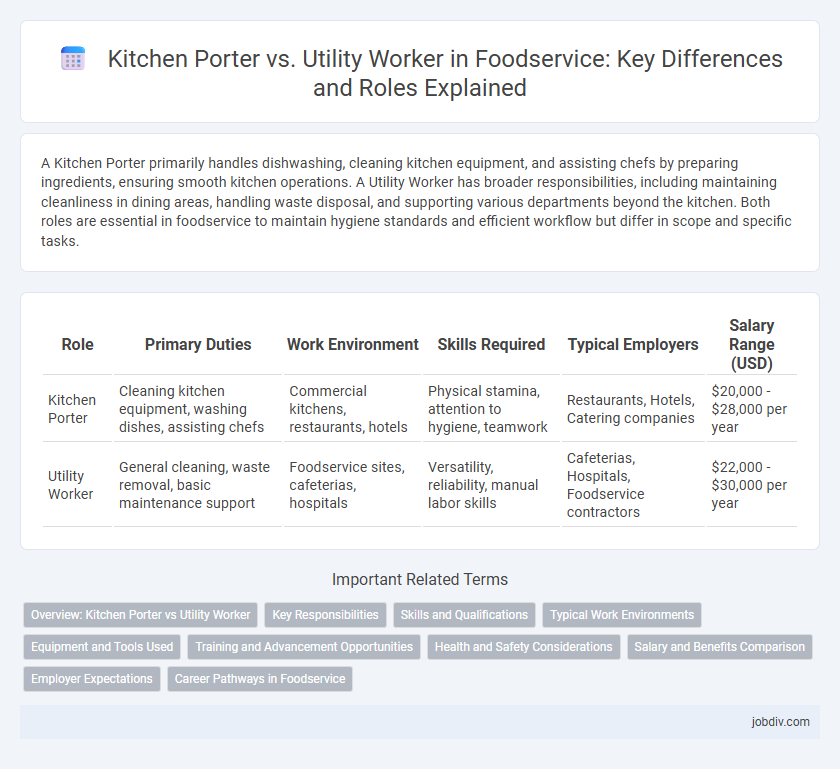A Kitchen Porter primarily handles dishwashing, cleaning kitchen equipment, and assisting chefs by preparing ingredients, ensuring smooth kitchen operations. A Utility Worker has broader responsibilities, including maintaining cleanliness in dining areas, handling waste disposal, and supporting various departments beyond the kitchen. Both roles are essential in foodservice to maintain hygiene standards and efficient workflow but differ in scope and specific tasks.
Table of Comparison
| Role | Primary Duties | Work Environment | Skills Required | Typical Employers | Salary Range (USD) |
|---|---|---|---|---|---|
| Kitchen Porter | Cleaning kitchen equipment, washing dishes, assisting chefs | Commercial kitchens, restaurants, hotels | Physical stamina, attention to hygiene, teamwork | Restaurants, Hotels, Catering companies | $20,000 - $28,000 per year |
| Utility Worker | General cleaning, waste removal, basic maintenance support | Foodservice sites, cafeterias, hospitals | Versatility, reliability, manual labor skills | Cafeterias, Hospitals, Foodservice contractors | $22,000 - $30,000 per year |
Overview: Kitchen Porter vs Utility Worker
Kitchen Porters primarily handle cleaning duties, dishwashing, and basic food preparation in commercial kitchens, ensuring hygiene standards are met. Utility Workers perform a broader range of tasks, including cleaning dining areas, restocking supplies, and assisting various departments beyond the kitchen. Both roles are essential in foodservice operations, with Kitchen Porters focusing on maintaining kitchen efficiency and Utility Workers supporting overall facility maintenance.
Key Responsibilities
Kitchen porters specialize in maintaining cleanliness in commercial kitchens by washing dishes, sanitizing surfaces, and disposing of waste, ensuring hygiene standards are met. Utility workers handle broader operational support including restocking supplies, basic food preparation, and assisting chefs during peak hours to maintain workflow efficiency. Both roles are essential in hospitality environments, supporting kitchen staff and contributing to the overall foodservice process.
Skills and Qualifications
A Kitchen Porter typically requires strong skills in dishwashing, kitchen cleanliness, and basic food preparation, often demanding physical stamina and attention to hygiene standards. Utility Workers in foodservice must exhibit versatility, handling tasks like waste disposal, equipment maintenance, and sometimes assisting chefs, with qualifications emphasizing multitasking and adherence to safety protocols. Both roles prioritize reliability and teamwork, but Utility Workers often need broader operational knowledge across kitchen functions.
Typical Work Environments
Kitchen porters typically work in fast-paced commercial kitchens, supporting chefs by cleaning utensils, maintaining hygiene, and assisting with food preparation. Utility workers operate in diverse foodservice settings such as hospitals, schools, and hotels, handling broader maintenance tasks including cleaning dining areas, restocking supplies, and assisting with basic food handling. Both roles require adaptability to high-volume and dynamic work environments to ensure smooth kitchen and service operations.
Equipment and Tools Used
Kitchen porters primarily handle cleaning and maintaining kitchen equipment such as pots, pans, ovens, and dishwashers, ensuring all tools are sanitized and ready for chefs. Utility workers use a broader range of tools including brooms, mops, garbage bins, and basic maintenance equipment to keep kitchen and dining areas clean and operational. Both roles require proficiency with cleaning chemicals and safety gear to maintain hygiene standards in foodservice environments.
Training and Advancement Opportunities
Kitchen porters typically receive on-the-job training focused on food safety, cleaning, and basic kitchen tasks, with advancement opportunities leading to roles such as line cook or kitchen supervisor. Utility workers often undergo training in sanitation, equipment maintenance, and stock management, enabling progression into specialized maintenance or inventory coordinator positions. Both roles offer foundational skills that can open pathways to higher-level positions within the foodservice industry.
Health and Safety Considerations
Kitchen Porters primarily handle dishwashing, cleaning, and waste disposal tasks, requiring strict adherence to hygiene standards to prevent contamination and maintain food safety. Utility Workers often manage multiple roles, including cleaning and basic maintenance, necessitating comprehensive health and safety training to mitigate risks from chemical usage and equipment handling. Both positions demand knowledge of proper use of personal protective equipment (PPE) and compliance with workplace safety regulations to reduce accidents and ensure a safe working environment.
Salary and Benefits Comparison
Kitchen porters typically earn an average salary ranging from $20,000 to $28,000 annually, while utility workers often receive slightly higher wages between $22,000 and $30,000, reflecting their broader responsibilities. Benefits for kitchen porters may include basic health coverage and staff meals, whereas utility workers frequently gain access to enhanced benefits such as paid sick leave, retirement plans, and flexible scheduling. Salary and benefits variations largely depend on the establishment's size and location within the foodservice industry.
Employer Expectations
Employers expect Kitchen Porters to primarily handle dishwashing, cleaning kitchen equipment, and maintaining sanitary conditions to support chefs and kitchen staff. Utility Workers are expected to perform a broader range of tasks, including general cleaning duties, waste disposal, and assisting with stock deliveries across multiple areas of the foodservice operation. Both roles demand reliability, physical stamina, and the ability to follow health and safety regulations strictly.
Career Pathways in Foodservice
Kitchen Porter roles often serve as entry-level positions in foodservice, providing foundational experience in kitchen operations and hygiene standards, which can lead to advancement as a Commis Chef or Line Cook. Utility Workers possess broader responsibilities, including cleaning, maintenance, and basic food preparation, allowing for a versatile skill set applicable to roles such as Foodservice Attendant or Catering Assistant. Both pathways offer opportunities for on-the-job training, skill development, and progression into supervisory or specialized culinary positions within the foodservice industry.
Kitchen Porter vs Utility Worker Infographic

 jobdiv.com
jobdiv.com